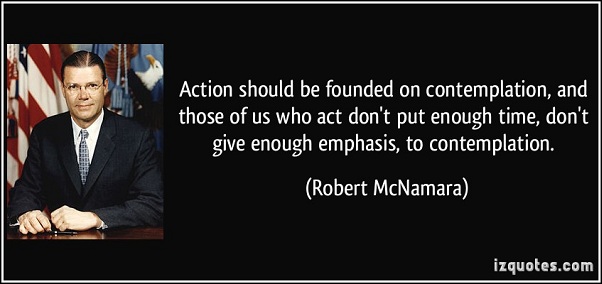[ by Charles Cameron — nutshell version: strategy should precede tactics as contemplation precedes action ]
.
**
Let me grab a quick quote from page 4 of Dr. Rob Johnston‘s Analytic Culture in the US Intelligence Community: An Ethnographic Study, and launch from there:
Warner reviews and synthesizes a number of previous attempts to define the discipline of intelligence and comes to the conclusion that “Intelligence is secret state activity to understand or influence foreign entities.”
Warner’s synthesis seems to focus on strategic intelligence, but it is also logically similar to actionable intelligence (both tactical and operational) designed to influence the cognition or behavior of an adversary.
**
Look, I’m an amateur reading professional materials, but what I sense here is a distinction between “actionable” and “strategic intelligence” — which for my purposes as a confirmed Taoist might semi-tongue-in-cheek be called “inactionable intelligence” and be done with it.
But of course while “inactionable intelligence” is certainly intelligence, it is by no means inactionable in any real sense. It is simply actionable at a different level or altitude, one more rareified if you will, closer to the needs of policy makers than those in the field, background hum to the vivid and pressing urgencies and exigencies of battle.
Let me take, from my reading when I began this post a week ago, and without giving them undue priority over a thousand such pieces that you or I might find, three headlines to illustrate my point:
American Conservative: COIN Is a Proven Failure; America risks shoveling more troops into Iraq to replicate a strategy that never worked in the first place EmptyWheel: Over $80 Billion Wasted in “Training” Iraqi, Afghan Forces: No Lessons Learned Informed Comment: Iraq Fail: Shiite Gov’t asks Sunni tribe to fight ISIL, but Sentences Politician from Tribe to Death
Agree or disagree with those three individual pieces as you may, each in turn depicts a situation where it is not the single raid or drone strike, firefight or rescue attempt, but the wider grasp of a war and its nth-order ramifications that is at stake. And while having a clear grasp of such things (seeing them in a coup d’oeuil, perhaps?) may not save or kill at the individual, small group, immediate tactical level, it can save tens or hundreds of thousands of lives, and perhaps even avert entire wars and their deranged after-effects, acting as what I’ll call “actionable wisdom” at higher altitude.
**
So we have the proposition: true inactionable intelligence is insightful actionable wisdom.
Now here’s the thing: everyone knows that actionable intelligence is useful — it is almost something you can touch or see — it gives meaning to the view in a sniper’s scope, it is visceral, present, immediate, concrete, practical.
By comparison, the high contextual intelligence I am calling “actionable wisdom” is more remote, theoretical, abstract — less tangible, less, let’s face it, sexy than “actionable intelligence”.
Yet it has a wider and deeper reach, and the potential to offer far more positive outcomes and save far more lives.
**
I often refer to Castoriadis‘ quote about how different philosophy would be if our paradigm for a “real object” in consiering what reality is was Mozart‘s Requiem rather than a kitchen table — a table seems more real than music, munitions more real than morale — but are they?
Or to put that another way — and I’m serious, if mildly metaphorical, in repurposing Stalin‘s quote — How many divisions has the Battle Hymn of the Republic?
As many as it brings courage to, would be my answer.
**
**
**
Footnoting that McNamara quote: It’s from Robert S. McNamara in Conversations with History, starting from the question at the 11.21 mark onwards. Here’s a more detailed transcript:
At times I think there is a tension between what you call contemplation and action. But I think there’s less tension than most people believe, and I myself believe a person of action, or let’s say an administrator if you will, should put more weight on contemplation, what you call contemplation, should put more weight on establishing values in his mind, establishing goals and objectives, for himself, for his organization, and those he’s associated with. Let me phrase it very simplistically: I don’t believe there’s a contradiction between a soft heart and hard head. In a sense, I don’t believe there’s a contradiction between contemplation and action. Action should be founded on contemplation, and those of us who act don’t put enough time, don’t give enough emphasis, to contemplation.
After a discussion of his role introducing safety features in the 1950s auto industry, he continues:
There’s no contradiction between what I call a soft heart and a hard head, or there’s no contradiction between what I’ll call social values on the one hand and a firm’s financial strength and sustainability on the other – that’s really what I was first trying to prove to myself and then trying to prove to others.



